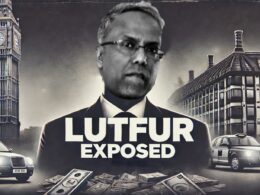The Secretary of State’s recent statement on Tower Hamlets Council is a blistering indictment of a council teetering on the edge of chaos, failing its residents and taxpayers by neglecting essential standards of governance, leadership, and community engagement. Tower Hamlets Council is under fire after a damning government report exposed a culture of distrust and alleged favouritism within Mayor Lutfur Rahman’s administration. The report, released as part of a wider investigation into the Council’s governance, describes an organisation crippled by secrecy and a “suspicious and defensive” attitude at the top.
Despite being freed from a prior government intervention only six years ago, Tower Hamlets has again drifted into crisis, with the current administration dismantling the very reforms that once helped it escape government oversight. The Council is now at risk of yet another intervention to enforce its legal duties, an extraordinary measure that underscores the depth of dysfunction plaguing this council.
The findings reveal that decisions are often made based on advice from a small, select group trusted by Mayor Lutfur Rahman. Many staff and external partners have described the culture as “toxic,” citing an atmosphere where genuine collaboration and transparency are rare.
The report paints a stark picture of Tower Hamlets as an organisation riddled with mistrust and toxic behaviour at its highest levels. Leadership, according to inspectors, is fractured by infighting and blatant disrespect between political parties, with executives more interested in power plays than public service. This dysfunction at the top has trickled down, fostering a “weak and confused” governance culture where scrutiny is not merely avoided but actively undermined. Due process, rather than being a foundational safeguard, is treated as a bureaucratic inconvenience to be sidestepped in the rush to fulfill the Mayor’s priorities. This council, it seems, has utterly lost sight of its duty to serve the community transparently and accountably.
The council’s pervasive “culture of patronage” has only worsened the situation, creating an atmosphere where decisions and appointments are made based on personal loyalty rather than merit. One of the most damning claims from the report is that this culture has created an environment where accountability is often lost, with those who “speak truth to power” reportedly feeling pressured to leave or keep quiet.
The culture of patronage at the Council is seen as so pervasive that even when favouritism isn’t explicitly at play, it still undermines trust across the board—eroding relationships between Council members, staff, and leadership, and damaging the Council’s credibility with outside stakeholders. This practice has sparked widespread distrust among staff, many of whom reportedly feel driven out of the organisation, which has resulted in “many good managers” having left the organisation. Such a culture is the antithesis of what any decent local authority should embody, breeding resentment, dysfunction, and a fractured workforce ill-equipped to serve the borough’s needs.
The Secretary’s statement is clear that Tower Hamlets’ issues extend well beyond internal politics. While the Mayor and Councillors are praised for their community engagement, this focus is criticised for distracting from crucial strategic and statutory obligations. Tower Hamlets has squandered opportunities for collaboration with key partners and community groups, neglecting the foundational partnerships that should be the backbone of effective local governance. Decisions are being made without consulting the very people they impact, creating an administration disconnected from the reality of residents’ needs.
Even more troubling is the Council’s apparent inability to engage in continuous self-improvement. Inspectors found a culture so deeply rooted in defensiveness that the leadership seems incapable of introspection or genuine reform. Improvements are sporadic, lacking any long-term strategic vision, and often appear more as reactive measures than a true commitment to bettering services for Tower Hamlets residents.
In response, the Secretary of State has proposed an extensive intervention package—a proposed three-year reform plan involving the reconfiguration of the Council’s Transformation Advisory Board, which will now include independent experts in leadership, governance, and culture to push much-needed reforms forward. The Council will also face increased accountability, with mandatory quarterly reporting on its improvement efforts and direct oversight from government-appointed Ministerial Envoys who will provide ongoing mentoring, support, and monitoring.
In effect, the government has proposed sending in ministerial representatives—similar to the commissioners appointed in 2015 — with sweeping reforms to the Council’s structure. This includes establishing a new oversight board with independent members to provide “external expertise” and much needed challenge to the current Aspire administration’s leadership. But questions remain about whether these reforms will be enough to restore public trust in a borough that has too often found itself embroiled in controversy. As Tower Hamlets’ residents watch this latest scandal unfold, they’re left wondering just how far the “toxic” culture in their council will go — and who is willing or able to finally fix it.
This proposed intervention is not a minor step; it is a necessary intervention to restore Tower Hamlets’ compliance with its Best Value Duty—a legal requirement that demands councils deliver effective, efficient, and lawful services to their communities. For too long, Tower Hamlets has been allowed to drift into dysfunction, leaving residents with a council that is unfit for purpose. This intervention package is Tower Hamlets’ last chance to right the ship and begin a meaningful journey toward reform, with the message clear: should they fail, the Secretary will not hesitate to escalate measures to protect the interests of the borough’s residents. A journey that was too far for Lutfur the last time round that has serious ramifications. We must not forget Lutfur’s last stint in office resulted in “widespread and serious” failings in Tower Hamlets council’s children’s services. Where the Mayor failed to ensure professional accountability that resulted in many children remaining in neglectful and abusive situations for far too long.
Tower Hamlets residents deserve more than the disarray and self-interest the current Aspire-led council has shown. They deserve a council that engages transparently, consults meaningfully, and governs with integrity. This intervention is a long overdue step toward that vision, setting a clear ultimatum for the council to either reform or face continued oversight until it proves it can meet the standards expected by its community and by the law. I suspect with the current level of competence at the top Mayor Lutfur Rahman will achieve neither.








